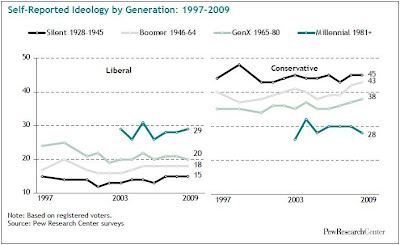 Last year we pointed out the magnitude Americans under 30 had on public opinion. Not only were they strikingly supportive of Barack Obama in the 2008 presidential election, but also of gay marriage, legalizing marijuana, curbing climate change, and amnesty for illegal immigrants.
Last year we pointed out the magnitude Americans under 30 had on public opinion. Not only were they strikingly supportive of Barack Obama in the 2008 presidential election, but also of gay marriage, legalizing marijuana, curbing climate change, and amnesty for illegal immigrants.A new Pew Report finds that the Millennials are still heavily Democratic, though their identification with the party has slipped about 8%.
Still, as any good political consultant understands, politics is about more than just “politics” - it is about the values that the voting public holds.

So what kind of values does this demographic hold?
First of all, their priorities compare with those of their parents, although not entirely. Whether the discrepancies are simply due to youth or if there's an actual shift is uncertain, but either way it’s something to take seriously when trying to communicate with them.
From the report summary:

In weighing their own life priorities, Millennials (like older adults) place parenthood and marriage far above career and financial success. But they aren't rushing to the altar. Just one-in-five Millennials (21%) are married now, half the share of their parents' generation at the same stage of life. About a third (34%) are parents, according to the Pew Research survey. We estimate that, in 2006, more than a third of 18 to 29 year old women who gave birth were unmarried. This is a far higher share than was the case in earlier generations.
But their shifting priorities and values aren’t meant to be part of a counter-culture. Unlike the Woodstock Generation of the Baby-Boomer years, they respect their parents - and their parents’ values - tremendously.
Looking back at their teenage years, Millennials report having had fewer spats with mom or dad than older adults say they had with their own parents when they were growing up. And now, hard times have kept a significant share of adult Millennials and their parents under the same roof. About one-in-eight older Millennials (ages 22 and older) say they've "boomeranged" back to a parent's home because of the recession.
They respect their elders. A majority say that the older generation is superior to the younger generation when it comes to moral values and work ethic. Also, more than six-in-ten say that families have a responsibility to have an elderly parent come live with them if that parent wants to. By contrast, fewer than four-in-ten adults ages 60 and older agree that this is a family responsibility.
They also bring different perspectives to the arena than older generations did.
Despite coming of age at a time when the United States has been waging two wars, relatively few Millennials -- just 2% of males -- are military veterans. At a comparable stage of their life cycle, 6% of Gen Xer men, 13% of Baby Boomer men and 24% of Silent men were veterans.
This is in part - no doubt - because of the intensity of their educational background. A record 39.6% of 18-22 year olds were enrolled in college in 2008. But just because they aren’t serving their country on the battlefield doesn’t mean they’re unwilling to serve in general. Quite the opposite, in fact.
Volunteering for an organization or helping others without being paid is one way many Americans are involved in their communities. Nearly six-in-ten (57%) Millennials say that they had volunteered in the past 12 months, which is no higher than the proportion of Gen Xers (54%) who said they had done this. About half of Baby Boomers (52%) and just 39% of those in the Silent generation say they volunteered in the past year.
Millennials also tend to be more ethnically diverse, less religious, and have higher confidence in the efficacy of government.
And then of course there are all the ways they are more technologically advanced, which is where we’ll pick up tomorrow.










No comments:
Post a Comment